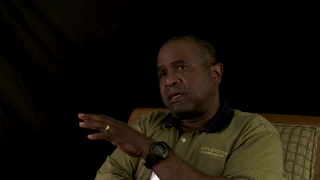3:55 | Vietnam forced a great change in Army training and operations. Conditions and equipment were upgraded and the quality of the soldiers improved with the advent of the all volunteer force. Chuck Ware was stationed in Cold War Germany when the new attitude swept in.
Keywords : Chuck Ware Vietnam training National Training Center (NTC) Fort Irwin Fort Polk Volunteer Army M113 Armored Personnel Carrier Bradley Fighting Vehicle M60 Patton M1 Abrams

In Cold War Germany, Chuck Ware was constantly in the field. Hard road marches and winter conditions were grueling, and with the Vietnam drawdown, they were drastically short of men. It was a long rebuilding process for the Army and it was necessary.
There were a lot of veterans in Starkville, where Chuck Ware grew up. The tradition of service impressed him and after his two years of mandatory ROTC, he decided to continue and took an Army commission when he graduated.
A lot of Chuck Ware's advanced ROTC training was patterned on Ranger School, due to the background of the cadre. On his way to the mechanized infantry, he did go to Ranger School, where at least a quarter of the class washed out.
Chuck Ware was selected for battalion command, but he deployed to Iraq as an Inspector General for General Barry McCaffrey. He soon had his battalion and was a little unnerved to find out that there were forty Lieutenant Colonels in the rear as replacements for battalion commanders who were killed. Saddam Hussein had been built up to be almost formidable.
There are things you don't think about until you are there. Mechanized battalion commander Chuck Ware scrambled to get his tanks and other vehicles fueled out in the desert. The battles were fought at night and American thermal imaging technology gave them a big advantage.
The battle at the Rumaila oil field came during a cease fire. Chuck Ware was directing a small group of tanks and supporting vehicles moving to investigate an Iraqi armored formation right in front of them. What he saw was that his unit was greatly outnumbered and his flanks were exposed.
On his way out of Iraq, Chuck Ware passed under a black sky filled with smoke from the burning Rumaila Oil Field. No one thought that it was over. The other shoe must drop. He recounts a story about General Barry McCaffrey accepting the surrender of a ditch full of Iraqis, and he talks about the period of adjustment once he returned to Fort Stewart.
What did not work right in Iraq? Battalion commander Chuck Ware has a list. The sand was insidious, getting into every crevice of every piece of gear. There were vast quantities of supplies, but no one knew where anything was in a sea of unmarked CONEX containers, including food and vital parts. Anti-aircraft gunners were operating as road guards, everyone was in chemical suits, and the .45 ammo didn't work.
The war simulations were easy after participating in an actual war. That's what Chuck Ware realized when he returned from the desert. He retired as the Deputy Commandant of the War College and then worked as a contractor in the Pentagon, where he never had duty during his long career.